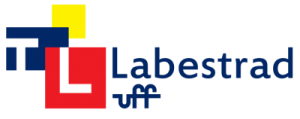Translation
English
Professor in charge: Giovana Cordeiro Campos (UFF/LABESTRAD)
Labestrad/UFF – Laboratory of Translation Studies at UFF – is an extension project coordinated by the Department of Modern Foreign Languages – GLE. It aims to train translators, providing a privileged space for the practice and reflection on translation, in its different modalities, based on translation demands from UFF’s internal and external communities. Therefore, Labestrad/UFF works with teaching, research and extension. Currently, it has six work teams – German, Spanish, French, English, Italian and Russian – made up by professors and undergraduate and post-graduate students. ENCIDIS translation and subtitling project includes the participation of Labestrad teams in English, with professors Giovana Campos (Coordinator of Labestrad/UFF) and Vanessa Hanes, and in French, with Professor Monica Fiuza. Professor Gian Luigi de Rosa, from Universidade Roma 3, coordinates the translation and subtitling process in Italian. As terminology reviewers, Labestrad/UFF counts on the participation of professors Beatriz Caldas, from UERJ, and Gileade Godoi, from CEFET.
In today’s highly globalized, technological and fast-paced world, translation is increasingly present and necessary, although quite a few of those who consume this service consider it a mechanical task. Analyzing translation more deeply, given the cultural diversity, historicity and opacity of languages, the process proves to be complex, since it is shaped by its conditions of production, which commonly involve asymmetrical power relations. The traditionally criticized translator’s “choices” are not as free as one might suppose, especially when one considers the political, social and economic factors that constitute human activities and subjects. In addition, several agents work in the execution of a translation, and not just the translator(s): the process involves applicants/contractors, translation companies (with their project managers, terminology consultants etc.), reviewers and editors, to name just a few. It also relevant to remark that the process must observe the acceptance of the translations’ recipient public and the writing and translation conventions in circulation.
Although translation has been a millenary practice, as an independent field of knowledge, the so-called Translation Studies were founded only in the mid-1970s, proposing translation as a complex cultural process, shaped by its local and contemporary socio-historical and political-ideological conditions of production. Since then, translation modalities and related research have expanded, including their relationship with the so-called “new technologies”, covering, for example, simultaneous interpretation, sign language interpretation, subtitling, audio description, website localization, localization of games, academic-scientific translation, literary translation, etc. All those areas require theoretical investigation, including their specificities, procedures and effects.
Regarding the translation of ENCIDIS video-recordings, the partnership between Labestrad/UFF and Laboratório Arquivos do Sujeito (LAS) sought to consider these issues in the field of academic-scientific translation in its relationship with audiovisual translation, more specifically the subtitling, as well as to reflect on the dissemination of science from Brazil outside its borders. The project has particularly interesting characteristics, as, in the case of the English and French teams, it involves training translation from students’ mother tongue to a foreign language. The characteristics relate to the fact that the participants’ learning is still in progress, plus the inherent difficulty of a specific translation modality that involves transforming an oral text in a written text, with all the problems that this entails. Translation for subtitling must consider that the viewer needs to see the image, hear the sound and be able to read the subtitle in milliseconds (NAVES, 2016), which means that this translation modality requires synthesis and simplification in order to facilitate the reading and understanding of the subtitles. Furthermore, oral texts carry marks such as hesitations, reconstructions and circumlocutions, many of which are not accepted in the written modality. The translation of the Encyclopedia also involves an investigation of the current processes of dissemination of science produced in Brazil and the questioning of an “Americanization of science” (LECOURT, 1995; ORLANDI, 2003). Thus, there are many factors to be evaluated in the ENCIDIS translation and subtitling process, considering the ways of expression both in the source conditions of production and in the possible subtitles’ recipient conditions of production.
Projects such as the translation of ENCIDIS within the scope of the partnership with Labestrad/UFF contribute not only to the dissemination of science produced in Brazil, but also to the students’ training, both for a greater knowledge of the languages involved, and the relationship between them, including the development of critical evaluations. In addition to promoting more specific training, which involves thinking about and carrying out translation and, in particular, subtitling, there are also initiatives in the field of translation teaching, with the development of didactic material and mini-courses on translation and subtitling, taught by students and faculty members, inside and outside the institution. Finally, audiovisual translation has become part of undergraduate and graduate curricula at UFF. Carrying out this work, which involves research and learning, represents an important incentive for studies and discussions on practices recommended for adoption in different spaces and conditions of production, providing academic and professional development for students and professors.

Labestrad – Laboratório de Estudos da Tradução da UFF
Rua Prof. Marcos Waldemar de Freitas, s/no. Campus do Gragoatá – Bloco C – sala 328
Niterói, RJ – CEP 24210-201
Email: labestrad.ingles@gmail.com / giovanacordeirocampos@gmail.com
